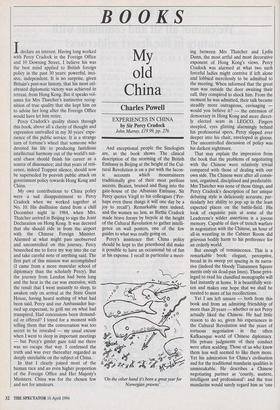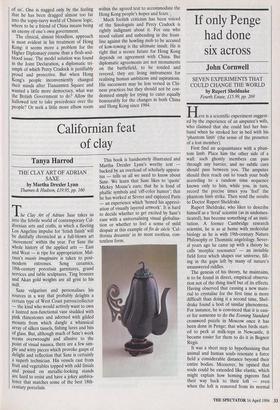BOOKS
My old China
Charles Powell
EXPERIENCES IN CHINA by Sir Percy Cradock John Murray, f19.99, pp. 276 I declare an interest. Having long worked with Percy Cradock in the Foreign Office and 10 Downing Street, I believe his was the best mind applied to British foreign policy in the past 30 years: powerful, inci- sive, independent. It is no surprise, given Britain's post-war history, that his most cel- ebrated diplomatic victory was achieved in retreat, from Hong Kong. But it speaks vol- umes for Mrs Thatcher's instinctive recog- nition of true quality that she kept him on to advise her long after the Foreign Office would have let him retire.
Percy Cradock's quality shines through this book, above all a clarity of thought and expression unrivalled in my 30 years' expe- rience of the public service. It is a strange turn of fortune's wheel that someone who devoted his life to producing fastidious intellectual harmony out of the world's nat- ural chaos should finish his career as a source of dissonance; and that years of reti- cence, indeed Trappist silence, should now be superseded by peevish public attack on government policy towards Hong Kong and China.
My own contributions to China policy were a sad disappointment to Percy Cradock when we worked together at No. 10. His disillusion dated from a chill December night in 1984, when Mrs. Thatcher arrived in Beijing to sign the Joint Declaration on Hong Kong. It was decreed that she should ride in from the airport with the Chinese Foreign Minister. Alarmed at what might pass unobserved and uncontrolled on this journey, Percy beseeched me to force my way into the car and take careful note of anything said. The first part of this mission was accomplished (I came from a more muscular school of diplomacy than the scholarly Percy). But the journey from London had been long and the heat in the car was excessive, with the result that I went instantly to sleep, to awaken only on arrival at the State Guest House, having heard nothing of what had been said. Percy and our Ambassador hur- ried up expectant, to grill me on what had transpired. Had concessions been demand- ed or offered? I toyed for a moment with telling them that the conversation was too secret to be revealed — my usual excuse when I went to sleep in important meetings — but Percy's gimlet gaze told me there was no escape that way. I confessed the truth and was ever thereafter regarded as deeply unreliable on the subject of China.
In that I clearly joined most of the human race and an even higher proportion of the Foreign Office and Her Majesty's Ministers. China was for the chosen few and not for amateurs. And exceptional people the Sinologists are, as the book shows. The clinical description of the storming of the British Embassy in Beijing at the height of the Cul- tural Revolution is on a par with the lacon- ic accounts which mountaineers traditionally give of their most perilous ascents. Beaten, bruised and flung into the gate-house of the Albanian Embassy, Sir Percy quotes Virgil to his colleagues (`Per- haps even these things it will one day be a joy to recall'). Remarkable men indeed, and the women no less, as Birthe Cradock made brave forays by bicycle at the height of the Cultural Revolution to gather intelli- gence on wall posters, one of the few guides to what was really going on.
Percy's insistence that China policy should be kept to the priesthood did make it possible to have an occasional bit of fun at his expense. I recall in particular a meet- 'On the other hand it's been a great year for Norwegian prawns' ing between Mrs Thatcher and Lydia Dunn, the most artful and most decorative exponent of Hong Kong's views. Percy Cradock was alarmed at what two such forceful ladies might contrive if left alone and lobbied mercilessly to be admitted to the meeting. When informed that the great man was outside the door awaiting their call, they conspired to shock him. From the moment he was admitted, their talk became steadily more outrageous, envisaging would you believe it? — the extension of democracy in Hong Kong and more direct- ly elected seats in LEGCO. Fingers steepled, eyes glinting alarmingly behind his professorial specs, Percy slipped ever deeper into his chair, enveloped in gloom. The uncontrolled discussion of policy was his darkest nightmare.
That may explain the impression from the book that the problems of negotiating with the Chinese were relatively trivial compared with those of dealing with our own side. The Chinese were after all consis- tent, organised, disciplined and predictable. Mrs Thatcher was none of those things, and Percy Cradock's description of her unique debating style is deliciously accurate, par- ticularly her ability to pop up in the least expected places on the battle-field. His look of exquisite pain at some of the Leaderene's wilder assertions is a joyous memory. Capable of days of trench warfare in negotiation with the Chinese, an hour of all-in wrestling in the Cabinet Room did grievous bodily harm to his preference for an orderly world.
But enough of reminiscence. This is a remarkable book: elegant, perceptive, broad in its sweep yet sparing in its narra- tive (indeed the bloody Tiananmen Square merits only six dead-pan lines). Those privi- leged to read his classified monographs will feel instantly at home. It is beautifully writ- ten and makes one hope that we shall be treated to more of his recollections.
Yet I am left unsure — both from this book and from an admiring friendship of more than 20 years — whether or not Percy actually liked the Chinese. He had little reason to do so, given his experiences in the Cultural Revolution and the years of tortuous negotiation in the often Kafkaesque world of Chinese diplomacy. His private judgments of their conduct were often scalding. Those of us who knew them less well seemed to like them more. Yet his admiration for China's civilisation and for the traditional mandarin qualities is unmistakable. He describes a Chinese negotiating partner as 'courtly, austere, intelligent and professional': and the true mandarins would surely regard him as 'one of us'. One is nagged only by the feeling that he has been dragged almost too far into the topsy-turvy world of Chinese logic, where to be a friend of China means being an enemy of one's own government.
The clinical, almost bloodless, approach is most evident in his treatment of Hong Kong: it seems more a problem for the Higher Diplomacy course than a flesh-and- blood issue. The model solution was found in the Joint Declaration, a diplomatic tri- umph of which Percy Cradock is justifiably proud and protective. But when Hong Kong's people inconveniently changed their minds after Tiananmen Square and wanted a little more democracy, what was the British Government to do? Allow the hallowed text to take precedence over the people? Or seek a little more elbow room within the agreed text to accommodate the Hong Kong people's hopes and fears.
Much foolish criticism has been voiced of the Sinologists and Percy Cradock is rightly indignant about it. For one who stood valiant and unbending in the front- line against the howling mob to be accused of kow-towing is the ultimate insult. He is right that a secure future for Hong Kong depends on agreement with China. But diplomatic agreements are not monuments on the battlefield, to be tended and revered, they are living instruments for realising human ambitions and aspirations. His successors may be less versed in Chi- nese practices but they should not be con- demned simply for trying to cater equally honourably for the changes in both China and Hong Kong since 1984.



























































 Previous page
Previous page